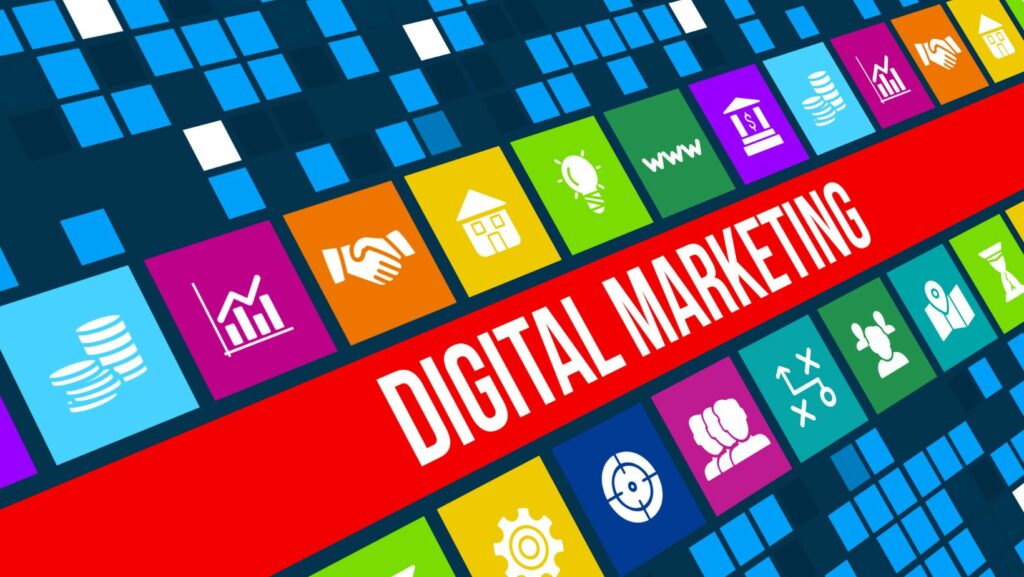Digital Marketing Landscape
- Evolving Landscape: The digital marketing landscape is rapidly changing due to technological advances and shifting consumer behaviors, making continuous adaptation essential for success.
- Key Components: Successfully leveraging core components like SEO, content marketing, social media marketing, and email marketing is crucial for enhancing audience engagement and driving conversions.

- Emerging Trends: Businesses should stay informed about emerging trends, such as artificial intelligence, marketing automation, and influencer marketing, to maintain a competitive edge.
- Consumer Engagement: Engaging consumers effectively on various online platforms is vital, with social media and high-quality content playing significant roles in brand loyalty and conversion rates.
- Navigating Challenges: Marketers must address challenges like data overload, privacy concerns, and competition while staying updated on rapidly changing algorithms to optimize their strategies.
- Data-Driven Decisions: Utilizing data analytics for insights and performance evaluation is critical for crafting effective marketing campaigns in a crowded digital arena.
The digital marketing landscape is constantly evolving, shaped by technological advancements and changing consumer behaviors. Businesses are increasingly turning to online platforms to connect with their audience, making it essential to understand the latest trends and strategies. From social media to search engine optimization, each facet of digital marketing presents unique opportunities and challenges.
As brands compete for attention in a crowded online space, mastering the digital realm has never been more crucial. Marketers must stay ahead of the curve, leveraging data analytics and innovative tools to craft compelling campaigns. This article delves into the current state of digital marketing, exploring key trends and insights that can help businesses thrive in this dynamic environment.
Overview Of The Digital Marketing Landscape
The digital marketing landscape constantly shifts, driven by technology and consumer behavior. Mobile devices account for over 50% of web traffic, highlighting the importance of optimizing marketing strategies for on-the-go audiences.
Marketers leverage various online platforms for audience engagement. Social media channels like Facebook, Instagram, and Twitter allow businesses to connect directly with consumers. Search engine optimization (SEO) ensures visibility across search engines, with Google handling more than 90% of global search queries.
Data analytics plays a critical role in shaping effective campaigns. Companies harness insights from consumer interactions to inform their strategies. Email marketing remains a powerful tool, achieving an average ROI of $42 for every dollar spent.
Innovative tools and technologies enhance marketing effectiveness. Artificial intelligence (AI) automates personalized marketing efforts, improving user experiences. Marketing automation software enables streamlined campaign management, allowing businesses to focus on strategic growth.
Staying abreast of emerging trends proves essential for success in this competitive landscape. Voice search optimization and video content engagement grow in popularity, compelling businesses to adapt their strategies accordingly. As competition escalates, businesses that prioritize adaptability and data-driven decisions stand to gain a significant advantage.
Key Components Of Digital Marketing
Digital marketing comprises several core components that businesses must leverage to succeed online. Understanding these elements enhances audience engagement and drives conversions.
Search Engine Optimization (SEO)
SEO refers to the process of optimizing web content to rank higher on search engine results pages (SERPs). It involves keyword research, on-page optimization, and backlink building. Techniques include optimizing meta titles, improving website loading speed, and ensuring mobile compatibility. Businesses that effectively utilize SEO can increase organic traffic by up to 50%, improving visibility and brand awareness.
Content Marketing
Content marketing focuses on creating and distributing valuable content to attract and retain a target audience. Formats include blogs, videos, infographics, and podcasts. Use of storytelling enhances audience connection. High-quality content builds trust and credibility, leading to higher conversion rates. Statistics indicate that companies investing in content marketing experience six times higher conversion rates than those that don’t.
Social Media Marketing
Social media marketing leverages platforms like Facebook, Instagram, LinkedIn, and Twitter to promote products and services. It involves creating engaging posts, running targeted ad campaigns, and interacting with followers. Studies show that 73% of marketers believe social media is effective for their business. Regular engagement on social media enhances brand loyalty and drives website traffic.
Email Marketing
Email marketing involves sending targeted messages to potential and existing customers via email. It focuses on building relationships and nurturing leads through personalized content. Marketers can segment their audience to tailor messages for better engagement. With an average ROI of $42 for every dollar spent, email marketing remains one of the most cost-effective digital marketing strategies.
Emerging Trends In Digital Marketing
The digital marketing landscape continuously evolves, with several emerging trends shaping strategies and approaches. Businesses must stay informed about these trends to maintain competitive advantages.
Artificial Intelligence And Automation
Artificial Intelligence (AI) enhances digital marketing by providing insights through data analysis. AI tools predict customer behavior, optimize ad targeting, and improve personalization efforts. Automation simplifies repetitive tasks, allowing marketers to focus on strategic initiatives. Automating email campaigns, social media posts, and customer responses leads to improved efficiency and better engagement. According to a study by Statista, the global market for marketing automation is projected to reach $8.42 billion by 2027, emphasizing the growing reliance on these technologies.
Influencer Marketing
Influencer marketing continues to gain traction as brands collaborate with social media figures to reach targeted audiences. Influencers have established credibility and trust with their followers, making their endorsements effective. A survey by Influencer Marketing Hub found that 63% of marketers plan to increase their influencer marketing budgets this year. Micro and nano influencers, with smaller but highly engaged audiences, often yield higher engagement rates than traditional celebrity endorsements. Effective influencer partnerships lead to enhanced brand visibility and increased conversion rates in today’s digital ecosystem.
Challenges In The Digital Marketing Landscape
Navigating the digital marketing landscape presents various challenges for businesses. These challenges require innovative solutions and adaptable strategies.
- Data Overload: Marketers face difficulties processing vast amounts of data from multiple sources. Extracting actionable insights from this data challenges successful campaign optimization.
- Keeping Up with Trends: Rapid technological advancements lead to constant shifts in consumer behavior and preferences. Marketers struggle to stay current with emerging platforms and tactics.
- Consumer Privacy Concerns: Increasing regulations surrounding data privacy, such as GDPR and CCPA, complicate data collection efforts. Marketers must balance effective targeting with compliance.

- High Competition: Digital spaces are saturated with brands vying for attention. Standing out amid fierce competition requires creativity and unique value propositions.
- Attribution Challenges: Accurately tracking customer journeys across multiple channels complicates measuring marketing effectiveness. Differentiating which efforts drive conversions remains an ongoing challenge.
- Budget Constraints: Allocating budgets effectively while ensuring a positive ROI can be difficult. Limited budgets can inhibit experimentation with new tools and strategies.
- Rapidly Changing Algorithms: Frequent changes to algorithms on platforms like Google and Facebook create uncertainty. Marketers must adapt quickly to maintain visibility and engagement.
- Talent Acquisition: Finding skilled professionals who understand emerging technologies and strategies poses a significant challenge. Organizations often struggle to recruit and retain top digital marketing talent.
Addressing these challenges requires continuous learning and agility to thrive within the dynamic digital marketing landscape.
Adaptability and Innovation
The digital marketing landscape is a dynamic arena where adaptability and innovation are key. Businesses must embrace emerging technologies and trends to stay competitive. By leveraging data analytics and automation, marketers can create personalized experiences that resonate with their audiences.
As the digital world continues to evolve, understanding consumer behavior and utilizing effective strategies like SEO and content marketing will be crucial for success. Companies that remain agile and responsive to changes will not only navigate challenges but also seize new opportunities.
Ultimately, thriving in this environment requires a commitment to continuous learning and an openness to experimentation.



